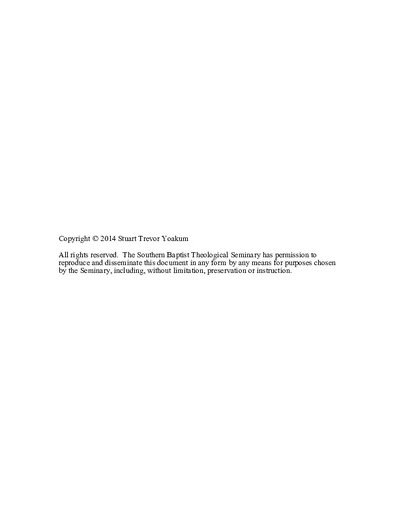| dc.description.abstract | This dissertation contends that the "Orality Movement" in missionary circles has a dearth of theological development and is therefore susceptible to doctrinal error leading to ministry practices that are potentially harmful to the spiritual health of newly planted churches. As a corrective, this dissertation presents Kevin J. Vanhoozer's theodramatically-revised Scripture principle as a paradigm for the use of orality in ministry. Through the use of a Toulmin-model argument from practical reason, each chapter develops the argument supporting the thesis or claim of the dissertation.
Chapter 1 establishes the first ground of the argument by establishing the legitimacy of Vanhoozer's theodramatically-revised Scripture principle. First, the chapter recognizes the improvement Vanhoozer makes to the classical orthodox position on the Scripture principle. Next, the chapter indicates how Vanhoozer responds to contemporary epistemological and hermeneutical concerns.
Chapter 2 states the second ground of the argument by demonstrating how the dominant medium of communication has an impact on human cognition. The chapter defines orality and details the origins and subsequent history of research in orality. The chapter concludes with a description of the two dominant schools of thought in orality research.
Chapter 3 develops the first warrant of the dissertation's thesis by chronicling the influence of orality research in both biblical studies and in missionary outreach.
Chapter 4 states the second warrant of the argument by identifying an analogical oral dynamic in various aspects of the theodrama including the Trinitarian economy, creation, redemption, and the inspiration of Scripture.
Chapter 5 demonstrates how Vanhoozer's revised Scripture principle can function as a paradigm by showing how it responds to Richard Osmer's four metatheoretical questions for practical theology as well as the four tasks of the discipline as a reflected practice. The reflected practice section includes a case study of how the use of the revised Scripture principle would allow one to respond to the use of an "oral Bible" by some mission practitioners. | en_US |

